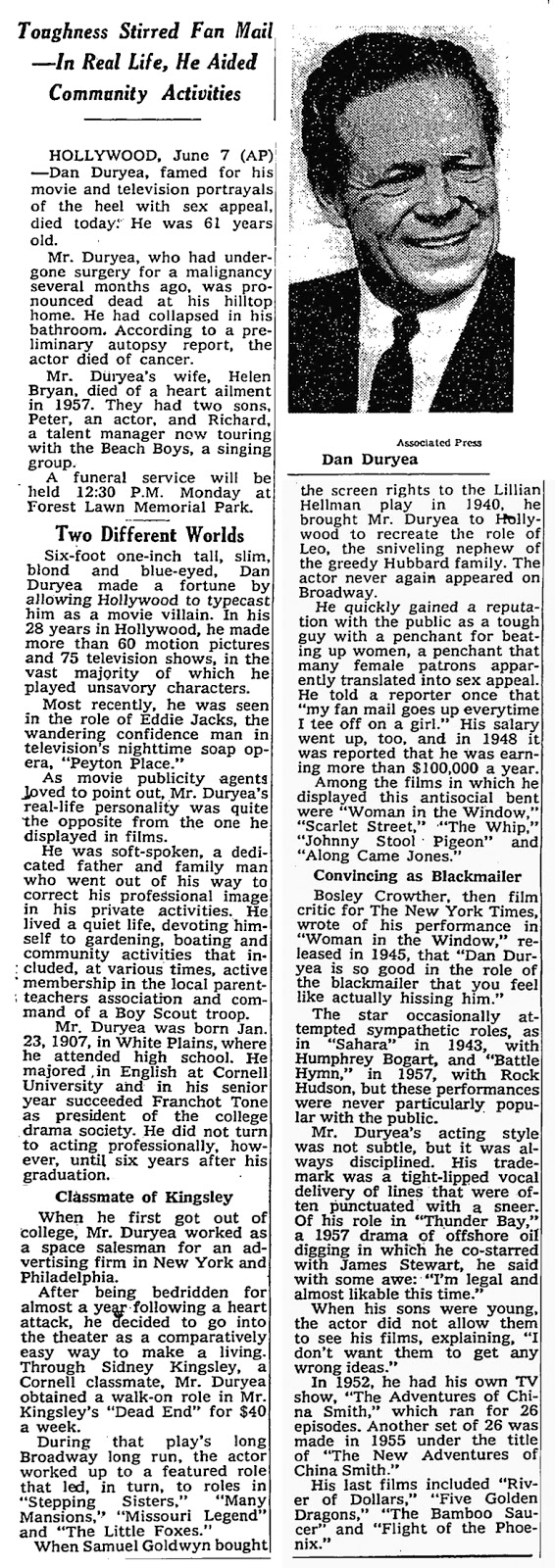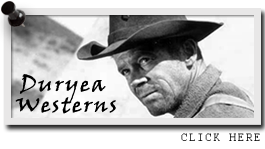New York Times: Dan Duryea Obituary (1968)
 New York Times (New York)
New York Times (New York)
June 08, 1968
DAN DURYEA DIES
TOUGHNESS STIRRED FAN MAIL;
IN REAL LIFE, HE AIDED COMMUNITY ACTIVITES
HOLLYWOOD, June 7 (AP) --- Dan Duryea, famed for his movie and television portrayals of the heel with sex appeal, died today. He was 61 years old.
Mr. Duryea, who had undergone surgery for a malignancy several months ago, was pronounced dead at his hilltop home. He had collapsed in his bathroom. According to a preliminary autopsy report, the actor died of cancer.
Mr. Duryea's wife, Helen Bryan, died of a heart ailment in 1957 [1967]. The had two sons, Peter, an actor, and Richard, a talent manager now touring with the Beach Boys, a singing group.
A funeral service will be held 12:30 P.M. Monday at Forest Lawn Memorial Park.
TWO DIFFERENT WORLDS
Six-foot one-inch tall, slim, blond and blue-eyed, Dan Duryea made a fortune by allowing Hollywood to typecast him as a movie villain. In his 28 years in Hollywood, he made more than 60 motion pictures and 75 television shows, in the vast majority of which he played unsavory characters.
Most recently, he was seen in the role of Eddie Jacks, the wandering confidence man in television's nighttime soap opera, "Peyton Place."
As movie publicity agents loved to point out, Mr. Duryea's real-life personality was quite the opposite from the one he displayed in films.
He was soft-spoken, a dedicated father and family man who went out of his way to correct his professional image in his private activities. He lived a quiet life, devoting himself to gardening, boating and community activities that included, at various times, active membership in the local parent-teacher association and command of a Boy Scout troop.
Mr. Duryea was born Jan. 23, 1907, in White Plains, where he attended high school. He majored in English at Cornell University and in his senior year succeeded Franchot Tone as president of the college drama society. He did not turn to acting professionally, however, until six years after his graduation.
CLASSMATE OF KINGSLEY
When he first got out of college, Mr. Duryea worked as a space salesman for an advertising firm in New York and Philadelphia.
After being bedridden for almost a year following a heart attack, he decided to go into the theater as a comparatively easy way to make a living. Through Sidney Kingsley, a Cornell classmate, Mr. Duryea obtained a walk-on role in Mr. Kingsley's "Dead End" for $40 a week.
During that play's long Broadway run, the actor worked up to a featured role that led, in turn, to roles in "Stepping Sisters," "Many Mansions," "Missouri Legend" and "The Little Foxes."
When Samuel Goldwyn bought the screen rights to the Lillian Hellman play in 1940, he brought Mr. Duryea to Hollywood to recreate the role of Leo, the sniveling nephew of the greedy Hubbard family. The actor never again appeared on Broadway.
He quickly gained a reputation with the public as a tough guy with a penchant for beating up women, a penchant that many female patrons apparently translated into sex appeal. He told a reporter once that "my fan mail goes up everytime I tee off on a girl." His salary went up, too, and in 1948 it was reported that he was earning more that $100,000 a year.
Among the films in which he displayed this antisocial bent were "Woman in the Window," "Scarlet Street," "The Whip," "Johnny Stool Pigeon" and "Along Came Jones."
CONVINCING AS BLACKMAILER
Bosley Crowther, then film critic for The New York Times, wrote of his performance in "Woman in the Window," released in 1945, that "Dan Duryea is so good in the role of the blackmailer that you feel like actually hissing him."
The star occasionally attempted sympathetic roles, as in "Sahara" in 1943, with Humphrey Boagrt, and "Battle Hymn," in 1957, with Rock Hudson, but these performances were never particularly popular with the public.
Mr. Duryea's acting style was not subtle, but it was always disciplined. His trademark was a tight-lipped vocal delivery of lines that were often punctuated with a sneer. Of his role in "Thunder Bay," a 1957 drama of offshore oil digging in which he co-starred with James Stewart, he said with some awe: "I'm legal and almost likable this time."
When his sons were young, the actor did not allow them to see his films, explaining, "I don't want them to get any wrong ideas."
In 1952, he had his own TV show, "The Adventures of China Smith," which ran for 26 episodes. Another set of 26 was made in 1955 under the title of "The New Adventures of China Smith."
His last films included "River of Dollars," "Five Golden Dragons," "The Bamboo Saucer" and "Flight of the Phoenix."











